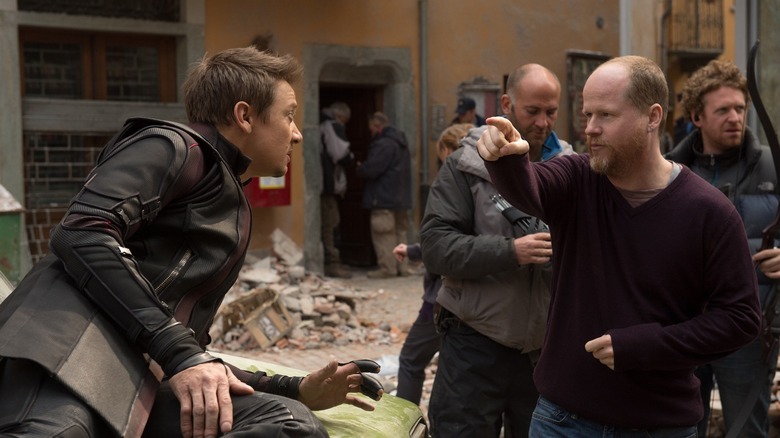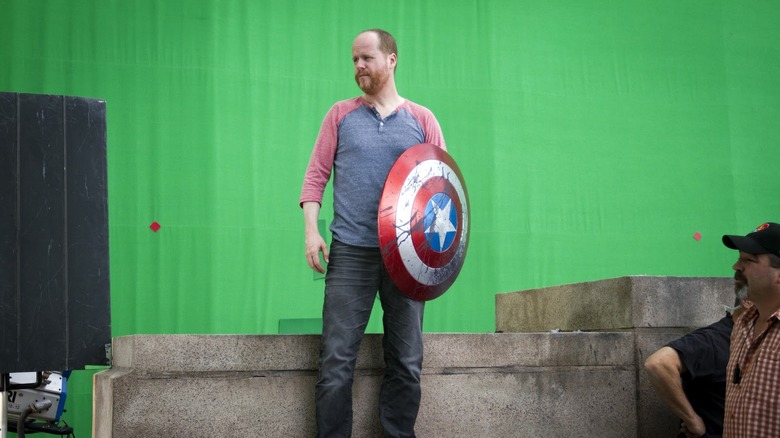How A Marvel Producer's Wife Helped Joss Whedon Get The Avengers Directing Gig
Last week saw the release of Abrams Publishing's massive 512-page tome "The Story of Marvel Studios: The Making of the Marvel Cinematic Universe" by Paul Terry and Tara Bennett. Inside there are many juicy details about the making of the first three phases of the Marvel Cinematic Universe, but one in particular gives fascinating perspective on the choice to bring in a key architect of the MCU: Joss Whedon. While it may have seemed like a no-brainer to the "Buffy" and "Firefly"-crazy fan community when Whedon was announced to write and direct "Marvel's The Avengers" in April of 2010, that film's executive producer Jeremy Latcham thought differently ... until he was convinced by his geeky significant other.
Here is an excerpt from the book where former Marvel Studios' exec Latcham explains how his wife author Aileen Erin helped shift things towards Whedon after an exhaustive search to replace the initially-hired Jon Favreau:
"'She's a big nerd. So I called her on the way home from the office and said, 'Hey ... Joss Whedon's a terrible idea for Avengers, right?' She was like, 'Are you f-ing crazy? That's the best idea I've ever heard in my entire life!' Latcham had not seen a single episode of Buffy, but his wife was quick to educate him. 'She said, 'Buffy is all mythology, ensemble, and character. You would love it. You should just watch all of it. And you should watch Firefly. I'm telling you, that's like the greatest idea I've ever heard?' And I was like, 'Oh. Okay. I'm glad that I called you.'"
Whedon also makes light of the situation in the book:
"It's not the first time I've heard that somebody's wife was like, 'Hey, pay attention!' Frankly, that's what kept Buffy on the air."
Not the Obvious Choice
After Whedon delivered two back-to-back global blockbusters with "Avengers" ($1.51 billion worldwide) and "Avengers: Age of Ultron" ($1.39 billion) he also served as a paid creative consultant on all of Marvel's Phase Two movies, adding in memorable scenes like the "trust my rage" moment in "Thor: The Dark World." He even developed the 7-season hit show "Agents of S.H.I.E.L.D." before ultimately parting ways with the studio. But this came after over two decades of the writer/director being a bit of an also-ran.
Whedon was unhappy with many of the films made from his screenplays (1992's "Buffy the Vampire Slayer," 1997's "Alien: Resurrection"), had been highly paid for spec scripts like "Suspension" or "Afterlife" that never got produced, and was disappointed to see his name taken off of big hits that he contributed heavily to like 1994's "Speed." Having originally started his writing career in television sitcoms like "Roseanne," he went back to the TV medium to take a mulligan on "Buffy," which proved to be a cult success that sustained 7 seasons and the 5-season spin-off "Angel." While those shows made Whedon a brand and very rich, the 2000s started a career downslide with the cancellation of his sci-fi show "Firefly" and the box office failure of its movie counterpart "Serenity." Whedon had also had a "Wonder Woman" movie that failed to take flight at Warner Bros. and the prematurely canceled series "Dollhouse." Even his horror satire "The Cabin in the Woods" made with Drew Goddard spent two years languishing on a shelf, and by the time he got the call from Marvel he had been taking episodic directing gigs for "The Office" and "Glee."
Whedon is now entering a slump of a different kind after recent workplace abuse allegations turned him into something of a Hollywood pariah and likely precipitated his exit from HBO's "The Nevers." Yet his contribution to the MCU was enormous, paving the way for story threads paid off in many movies since, including "Avengers: Endgame." He would not have been able to make those contributions had it not been for one thoughtful woman, though.

